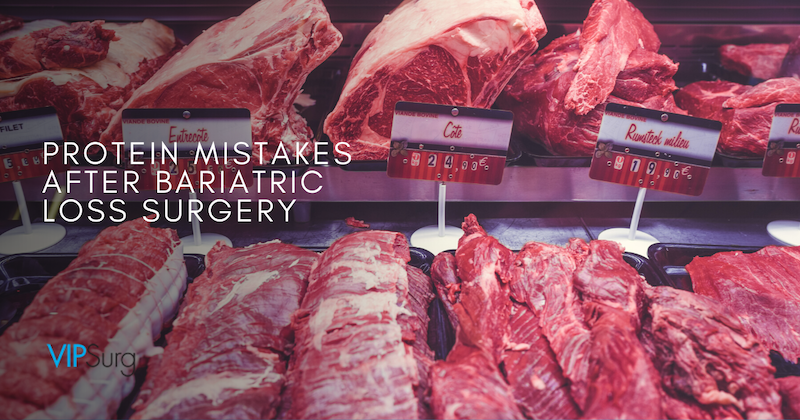From well before bariatric surgery to long after, one common theme is protein. Bariatric patients require at least 60 to 80 grams of protein each day. This may seem daunting, but patients quickly find that it is not terribly hard to achieve this goal with thoughtful eating. With time, knowing exactly how to get to your protein requirement becomes second nature. However, not all proteins are made the same. Here are mistakes some patients make that reduce the effectiveness of their protein consumption regimen.
Eating only meat proteins / Eating difficult proteins
Meat is a great source of protein and can easily be prepared in ways that are both delicious and healthy. However, not all meat is digested in the same way. Many patients try to fill their protein requirements with meat alone, but may be missing out on other great proteins. While many meats provide complete proteins – those that have all the amino acids necessary for metabolic and cell health, some such as red meat are more difficult to digest. Try to increase your consumption of chicken thighs, fish and shellfish that are all easier proteins to manage. Try complete non-meat proteins as well, like soy/tofu and quinoa.
Protein loading
Your body can only absorb about 30 g of protein at a time. It is therefore imperative that you do not try to load all of your protein into a short period of time. Rather, each of your meals should be high in protein and you should get your total protein throughout the day over the course of the entire day. Try to split your protein requirement in three and, for example, have about 20 grams of protein for breakfast, 20 for lunch and 20 for dinner. You can get even more protein with healthy snacks during the day.
Only eating incomplete proteins
Other than quinoa and soy, only meat-based proteins offer the complete range of amino acids that the body requires for proper metabolic processes. Avoiding meat entirely can be problematic to getting the appropriate protein intake. Vegetarians and vegans will need to consider a complete protein supplement. Mixing and matching proteins to get complementary proteins can be hard to track and often leads to deficiencies.
Choosing low quality proteins
There are differences between low quality and high-quality proteins. Low quality proteins typically represent those foods that along with the protein have a whole load of bad stuff. While you may find that many foods are high in protein, they may also be high in sugar, sodium or saturated fat for taste. These low-quality proteins may actually work against your caloric intake requirements and lead to slowing weight loss or even weight regain. Make sure that the proteins you choose are truly healthy. Many of these are listed in your postoperative packet
Relying only on proteins shakes
Liquid protein is easy to consume and tastes good. As a result, some bariatric patients over-rely on protein shakes to get them through the day. Instead, protein shakes should supplement food-based proteins such as meats, certain legumes and dairy. Remember that you are trying to create a sustainable dietary plan. This means that variety is important. Further, your body processes solid proteins differently from liquid proteins and you will feel full longer when a large proportion of your daily protein comes from solid foods.
The bottom line is that protein is especially important for the proper working of the metabolic system. Too little protein and body will burn muscle mass. Further, protein helps the recovery process immensely in the period immediately after surgery both in avoiding infection and healing for quickly. As such, it’s not only important to get enough protein each day, but it’s also important to get your protein the right way. If you have any questions about consuming protein and whether what you’re doing is enough, feel free to contact our practice
